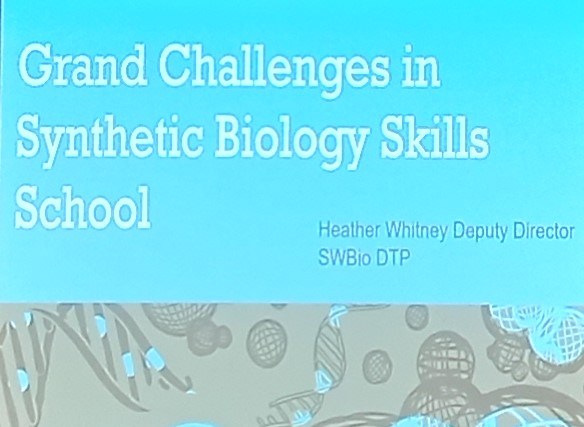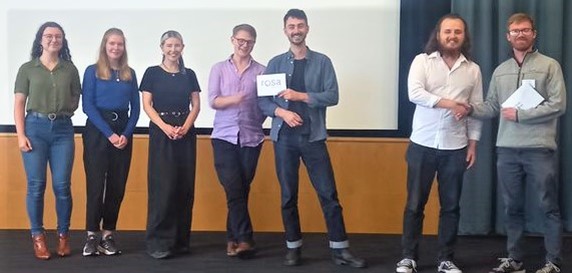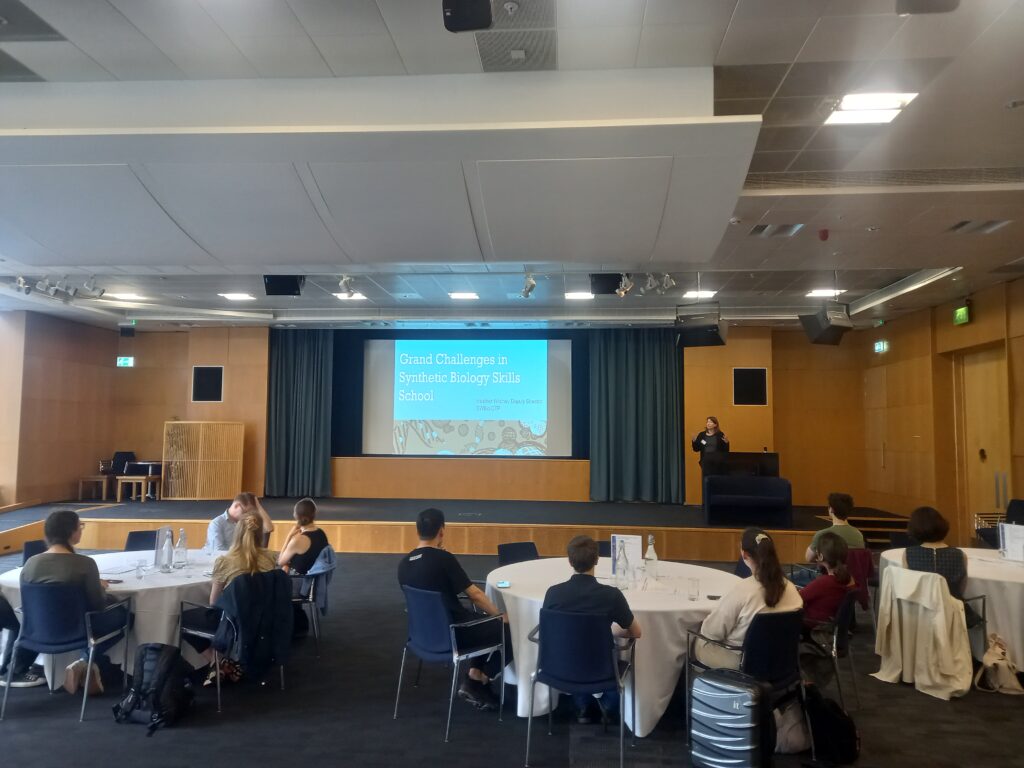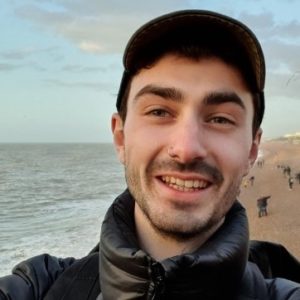Jack Stenning (University of York) and Andrew Cowan (University of Leeds) took part in the Grand Challenges in Synthetic Biology skills school this summer. This was a four-day residential event hosted by South West Biosciences DTP and funded by the BBSRC, held in Bristol. We interviewed them about their experience…
About the experience
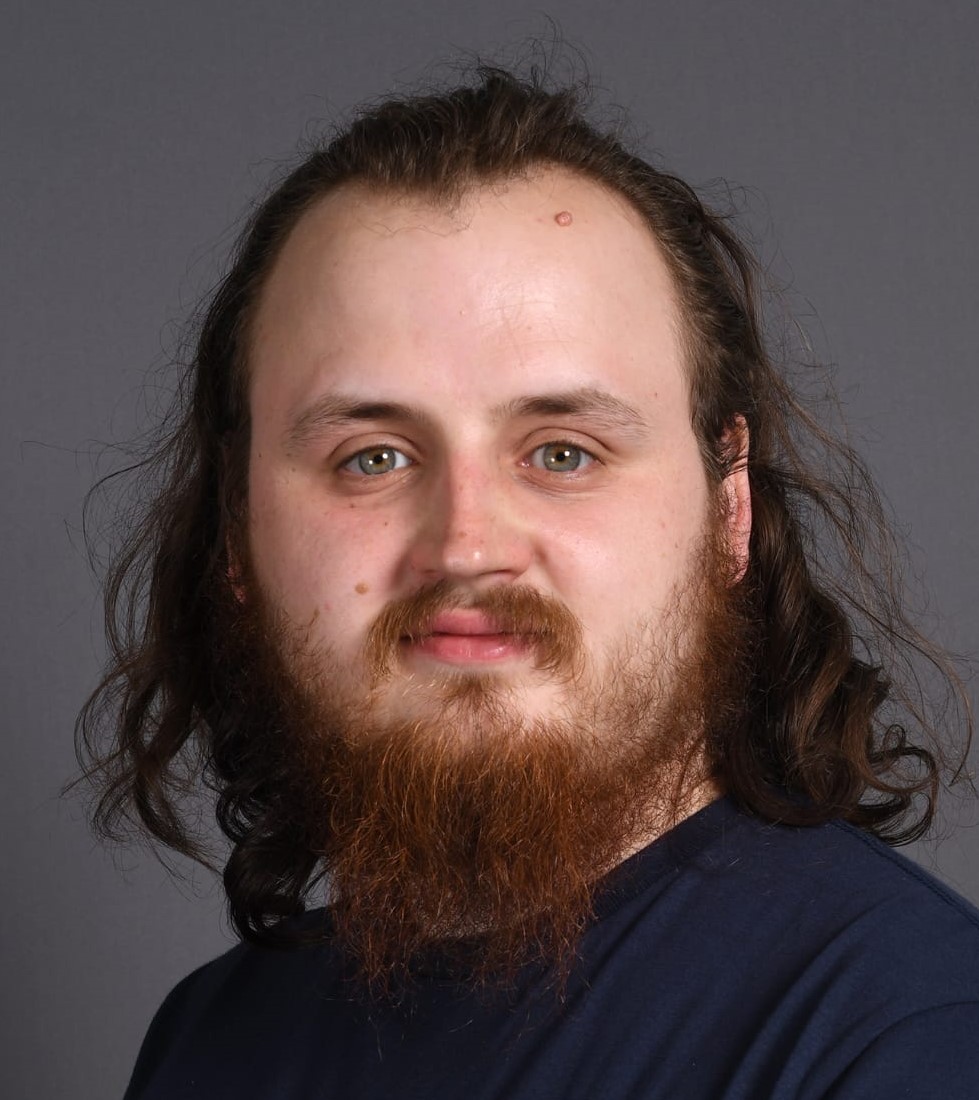
Jack Stenning
Twitter: @JackStenning6
LinkedIn: /in/jack-philip-stenning
DTP Profile
How did you find out about the opportunity and what made you sign up for the summer school?
Jack-
I first saw the opportunity when it was circulated around the DTP students by Catherine. I signed up for the school because it was hard to find things not to like! They seemed to offer teaching on a wide range of skills that you don’t usually get to develop as part of a PhD. However, the real decider was the fact they offered all of this for free! Other than travel costs, everything was paid for including food and accommodation. I had begun to feel like there wasn’t as much being offered to DTP students at the start of summer, so this seemed like an amazing opportunity to make use of everything the DTP gives us access to.
Andrew-
The summer school was advertised via email and was open to students funded by a BBSRC-led DTP. I have always been interested in the interface between industry and academia, especially around biotechnology/synthetic biology and it being a free event made it a no-brainer to apply!
Can you summarise what the week involved?
Jack-
The week started with the visitors from SetSquared, a world-leading business partnership for business incubation, giving an introduction to why and how you would make a business. From teaching us what different IP protections provide to support schemes for market research, they gave us a good basis for starting a business. Setsquared later delivered a really useful workshop on how to conduct market research in order to better sell our product.
The week involved talks from research experts, a discussion on how to market yourself for careers in industry, and tour around the University Enterprise Zone. I had no idea that spaces like that existed to support new entrepreneurs and it gave me more confidence in starting a business.
We were split into groups, given our company brief and were told to think about the problem provided by the company and how we could help them tackle it. After some discussion on how we could approach the brief, we were given some time to talk to the CTO of the company, Arne Scott. This allowed us to get some incredible insight into the direction of the company as well as let us bounce our early ideas off him.
While working on our group business pitch, key stakeholders with relevant knowledge were brought in so we could discuss key aspects of our pitch. This was perhaps the most useful session as some of the professionals absolutely shattered some of our preconceptions and gave us really useful advice. It also highlighted the importance of one of the first things we were taught about this week – market research! Furthermore, it was an amazing opportunity to speak with such insightful experts and gave a lot of insight into how scientific business is done both in industry and in the public sector. On the final day we prepared our pitch and then delivered it to the panel.
Andrew-
The four-day residential was hosted by Southwest Biosciences DTP at the University of the West of England (UWE) and it was attended by PhD students from interdisciplinary subject areas (e.g. Biology, Chemistry, Maths, Computer Science). Upon arrival we were split into teams and each team was paired up with a small-medium enterprise/start-up company in the field of science and technology. We received a brief and then worked to develop the company’s existing technology into a new market area or application. At the end of the four days, we were expected to pitch our ideas back to the company founders and other experts in the field, along with compiling a short report of our findings/market research.
The days were also packed with workshops (how to conduct market research, identifying and discussions with relevant stakeholders), talks (transitioning from academia to industry, talks from company founders), and tours of the start-up lab facilities at UWE. This programme of events helped guide our idea formulation regarding the company briefs and gave us a really good understanding of what it takes to take an idea from the lab into the real world.
Which enterprise did you work with? How did you develop your pitch? And what did you pitch to them?
Jack-
We do need to be careful about what we say, as we were given full access to whatever we needed, including confidential material regarding the company’s current enterprise.
We worked with Rosa Biotech, a company that uses a panel of optimised protein barrels to bind small molecules. Rosa uses this panel to identify the binding pattern in patients with non-alcoholic fatty liver disease (NAFLD) compared to people who don’t suffer from NAFLD. Rosa then uses machine learning to identify the differences between the two groups in order to generate a disease fingerprint. So, that means when the algorithm is given a sample with unknown NAFLD status, it is able to use the fingerprint to give a confident diagnosis for that patient.
Given the current application of the panel, we decided that staying within the medical diagnostics market was the best decision. This is because it would require the least amount of investment to pivot, and it is the largest market in which this technology is applicable. With that in mind, we wanted to look into areas of medicine in which diagnosis is currently confounded by the methods available. We ultimately decided to suggest the company move into the diagnosis of female reproductive disorders with a focus on endometriosis. Many female reproductive disorders like endometriosis take years to diagnose and are often misdiagnosed for a number of complicated reasons.
We ran this idea past the CTO, Arne Scott, who revealed to us that the company had considered this in the past, so we knew we were on the right track. From there it was a case of building our argument, both in how Rosa is already in a good place to tackle the challenge and how beneficial it would be for Rosa to enter into that market.
Andrew-
Our team worked with Rosa Biotech who specialise in molecular sensing for medical diagnostic purposes. The technology they use is unique in the sense that it doesn’t rely on specific biomarkers for diagnosis but instead captures a ‘disease fingerprint’ which is compared against healthy individuals and interpreted using a back-end machine learning approach.
Our brief was fairly open in respect to which market we could focus our ideas on – this was both a blessing and a curse as we spent a chunk of time investigating ideas in agriculture, environmental monitoring, and industrial bioprocessing. Eventually, we settled on looking at using this technology in the field it had been originally developed for (I.e. medical diagnostics), and we formulated our idea around diagnosing other hard-to-diagnose diseases, specifically a group of female reproductive disorders that are often misdiagnosed.
It took us a while for to arrive at this idea, though the decision-making process was really informative and supported by the programme of events at the summer school (e.g. talks with relevant stakeholders).
How did you feel about presenting the pitch itself? What feedback did you receive?
Jack-
I am always pretty comfortable with public speaking but this felt slightly different to a usual presentation of my scientific work. I felt like I had to sell what I was saying more than I did with my other work. We received really good feedback on our presentation. There were some areas of market research they wished were more detailed, but given the time constraints, they were happy with what we produced.
They really liked how thought out our future steps were as we had come up with a pipeline from whom they could contact today about funding through to adapting the platform to a home test kit once established.
It was clear they were very happy with our work as we were awarded the best pitch! Admittedly I was quite confident about our chances because our team had worked so well together over the week. Everyone pitched in, we had really great discussions about how to tackle the challenge and we all worked very hard when we needed to. It really was a team effort!
Andrew-
The pitch itself was a fun experience, though a little nerve-racking as the company founders were amongst the panel of judges. The short format of the presentations (5-6 slides) left no room for waffling (think Dragons Den style) and there was time at the end for questions/feedback from the judges. All of the pitches were well-done, and it was really interesting to see where each team had gone with their brief. Our team received positive feedback – especially around our proposed plan of how we would translate the idea into a usable product – and the judges announced us as the winners (although everyone was a winner, really!).
What did you enjoy the most during the week?
Jack-
I definitely found speaking with the CTO of our company and its stakeholders to be the most interesting part. Although the workshops were great for acquiring new knowledge, speaking with these experts gave us a chance to deploy the skills we had learned to learn more from these amazing people.
Andrew-
I really enjoyed meeting new people and the collaborative/supportive nature of the summer school. Although the days were quite busy, we still had plenty of time in the evenings to sit down and develop our ideas within our team/with other teams and to just chat generally about doing a PhD whilst enjoying dinner.
Which parts did you find most beneficial to you? Was there anything particularly interesting you learnt?
Jack-
My answer is going to be annoyingly abstract but I most enjoyed being given a difficult challenge in something I haven’t much experience in. The entire week was a steep learning curve and although it was definitely hard, I enjoyed every step along the way.
In particular, winning the best pitch has proven to me that I can undertake challenging tasks that I don’t necessarily have developed skills in and still do well. After returning to my PhD project, in which I have trained for several years to get to this stage, I have a newfound confidence that will serve me well going forward.
Andrew-
Learning about the ins and outs of beginning a start-up/small medium science company was particularly interesting – before my PhD I worked for a start-up science company so I knew some things, but I learned lots of new knowledge around intellectual property, how to conduct market research, and how stakeholders can be useful for shaping an idea. It is also nice to be reminded of the transferable skills that you gain as a PhD student and how these are desirable for different career prospects.
What have you learnt about Synthetic biology enterprises or industry that you didn’t know before?
Jack-
I most enjoyed the tours around the UEZ and Future space. I had no idea that there were places entrepreneurs could go to develop their business ideas for free. It has really opened my eyes to the possibilities of starting my own business after my PhD.
Andrew-
Finding out about the facilities (e.g. start-up incubators/accelerators, lab-spaces, business support) available to those just starting out was interesting and it gave you a good idea of both the challenges and support available to new company founders.
What career are you thinking about post-PhD and do you think this will be beneficial?
Jack-
I am still undecided on my career going forward, but I do plan on staying in academia for the near future. However, I think that my experience at the skills school has definitely changed my outlook on moving into industry and even spinning out or starting up my own company.
Andrew-
I don’t have my mind set on a single career route post-PhD, though I am leaning towards a career outside of academia, whether that be in industry or something else. Despite this. the summer school was really beneficial in exposing you to potential career paths, and highlighting transferable skills that you gain as a PhD student.

